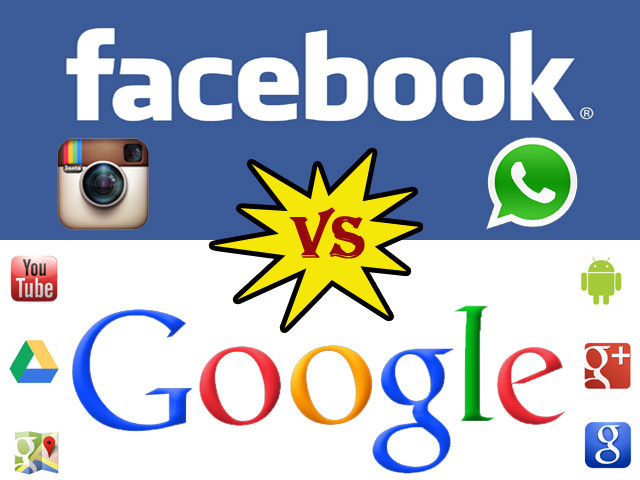This post, however, is not about how to sedate the internet; it is about trying to figure out why Facebook spent more money than the Gross Domestic Product (GDP) of 82 countries to a buy an app that can be downloaded for free.
Just in case you were on an exploration mission to outer-space and missed the details, have a look at this and maybe this brilliant commentary too.
To answer the 19 billion dollar question, let’s start by stating the fact that serve as the backdrop for this acquisition.
Facebook wants to overtake Google in ad revenues!
In 2013, Google raked in $50.57 billion in ad revenues while Facebook tried to catch-up in second place with $6.98 billion. The chart below elaborates on the global digital ad revenue scenario.

This brings us to the real question. How would the acquisition of WhatsApp help Facebook grow its ad revenues faster than Google?
There are three key factors that guide us towards the answer to this question.
1. Cell-phones are the future
The fact-based estimation below by industry expert Benedict Evans pretty much sums up the ascension of cell phones to the top. For more proof read this too.

Given the rise of cell-phone users, Facebook is consciously trying to become a cell phone company. In Q4’ FY13, Facebook’s ad revenue from cell-phones surpassed that from PCs. Although Google has 48.76% market share of global mobile ad revenues as compared to 16.91% of Facebook, Facebook grew mobile ad revenues three times faster than Google in 2013.
By acquiring the largest social messaging app with 450 million monthly active mobile users, Facebook aims to strengthen its strategy to grow faster than Google in mobile space through better understanding of mobile users.
2. Emerging markets and young people
In the coming years, highest growth in internet usage and Smartphone penetration is going to come from two sources; emerging markets and youngsters.
The unique thing about users from emerging markets and youngsters is that most of them have already or are going to experience internet first on Smartphones or tablets, bypassing PCs. WhatsApp is a clear winner on all fronts here as it is adding new users at the rate of one million per day.
WhatsApp is more popular in emerging markets and amongst the youth, and for many it is the first point of entry to experience ‘internet’. WhastApp even works on inexpensive phones such as the Nokia Asha, making it easy for youngsters in countries such as India and Pakistan to connect and chat while avoiding expensive SMS rates.
While Google has already made inroads in emerging markets and new and young Smartphone users through Android, the acquisition of WhatsApp and Instagram does give Facebook a fighting chance to compete with Google on these two fronts.
3. Real-time insights for better ad targeting
Advertisers are willing to pay more money and that too more frequently if their ads reach the right audience at right time.
To reach the right audience the ads need to be targeted accurately and for that, companies like Google and Facebook need real-time insights from users that are swiping away on multiple screens as we speak. Google uses real-time insights from its search engine, YouTube, Google+, Gmail and Gtalk amongst others to improve its ad-targeting accuracy.
Facebook, on other hand, has Instagram and a user data of its own to generate insights for targeting ads accurately.
Now add WhatsApp to that equation.
With nearly 50 billion messages sent back and forth daily, imagine the level of real-time insights Facebook can generate to target its ads to where and when they matter the most.
Consider a scenario in which a group discussion on WhatsApp about a camera purchase decision among friends enables Facebook to target an ad by Nikon to those particular participants of that WhatsApp group when they login or refresh their Facebook page.
Would that give Facebook an edge over Google in luring Nikon to spend more on advertising with Facebook?
It is clear that Facebook bought WhatsApp to compete with Google in the future. The race is on to gain share of digital and mobile ad revenues. The Return On Investment (ROI) of Facebook’s $19 billion investment would depend on its ability to leverage the three factors mentioned above in this post.
The key challenges it would face would include privacy concerns, sustained growth of WhatsApp as a standalone offering and its ability to process Big Data into useful insights that translate into advertising riches.
This is just my interpretation of this event and I may be totally wrong. In fact, I would want to see Facebook do something crazier with this acquisition such as developing a wearable device that merges social messaging (WhatsApp), social networking (Facebook) and social picture sharing (Instagram) into one.
Looking forward to receiving feedback on what you think about this deal. What do you think Facebook will do? How will its competitors react?
This post originally appeared here.



COMMENTS
Comments are moderated and generally will be posted if they are on-topic and not abusive.
For more information, please see our Comments FAQ